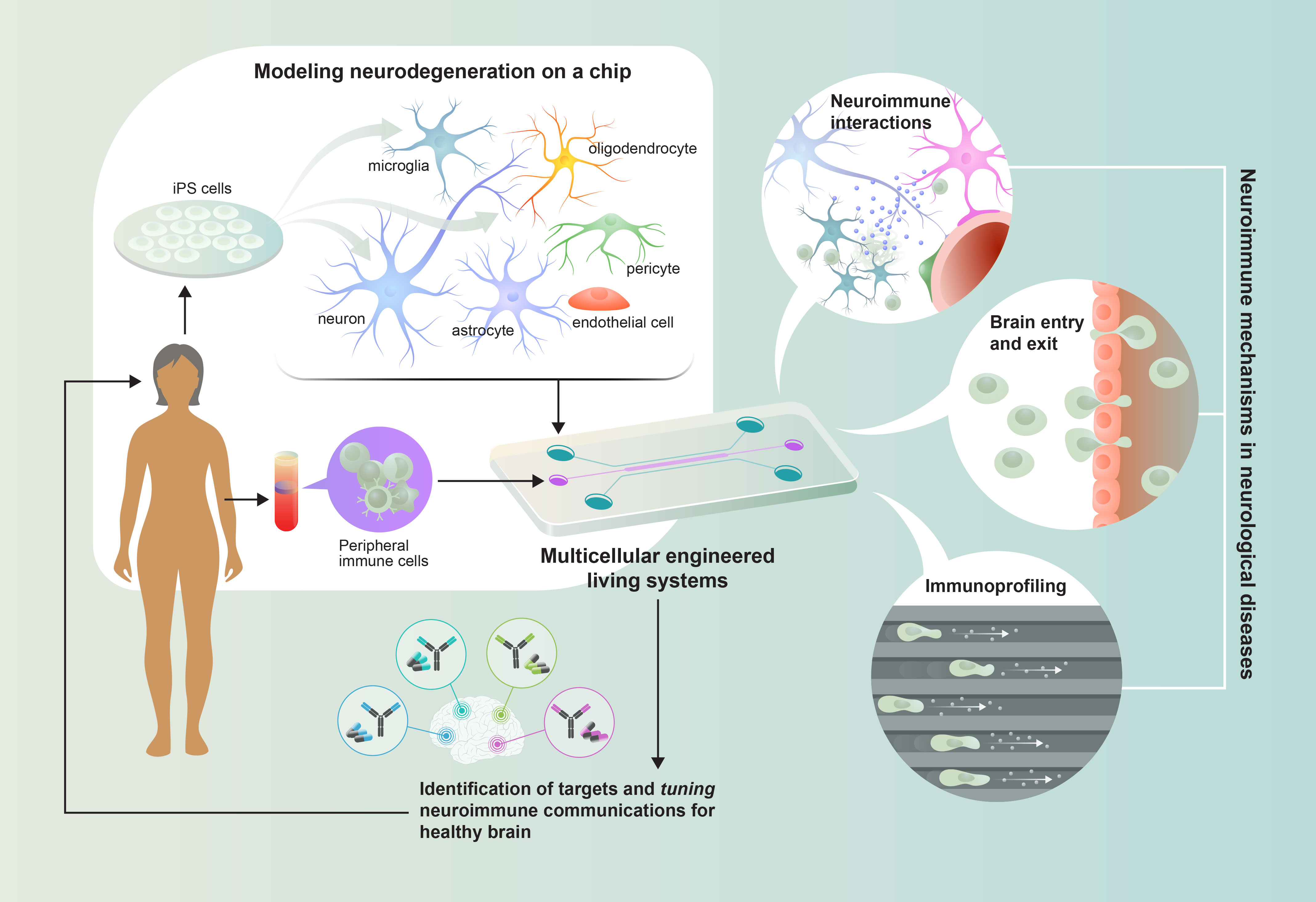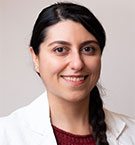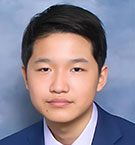Jorfi Lab
Contact Information
Jorfi Lab
MGH Department of Neurology
Genetics and Aging Research Unit
Bldg. 114, 16th Street
Charlestown,
MA
02129
Email: mjorfi@mgh.harvard.edu
Mehdi Jorfi, PhD
Assistant Professor of Neurology
Harvard Medical School
Massachusetts General Hospital
Explore This Lab
Research Overview
The interplay between the brain and the immune system plays a critical role in the neuropathology of neurological diseases. However, precise mechanistic underpinnings still need to be discovered. Interactions between the nervous and immune systems are complex and can have beneficial or detrimental impacts on brain function, depending on the context. Thus, it is crucial to understand the biological mechanisms that give rise to these divergent outcomes.
The Jorfi Lab develops multicellular engineered living systems as human surrogates to model components of the human immune system and delve into the mechanisms underlying neural-immune crosstalk in neurological diseases, primarily focusing on Alzheimer’s disease and multiple sclerosis. Leveraging a multidisciplinary approach, the lab combines molecular and cellular biology, neuroimmunology, multicellular engineered living systems, transcriptomic and functional profiling to discover fundamental neuroimmune interactions and inspire new therapeutics for patients with neurological conditions.

Projects in the lab fall into three major categories:
Modeling neurodegeneration using multicellular engineered systems
The current understanding of neurological disorders primarily derives from studying patients and animal models. However, patient examinations often miss the early stages of disease progression and provide limited opportunities for intervention. Animal models also fall short in fully replicating human pathophysiology. To address these gaps, the Jorfi Lab is creating tissue chip platforms that use microfluidic technologies and 3D-cultured human pluripotent stem cells. These models include neurons, astrocytes, microglia, vascular networks, and peripheral immune cells, providing a holistic representation of the complex interplay between the nervous and immune systems and their interactions in neurological diseases. The lab aims to unravel the molecular intricacies of central-peripheral immune interactions and their role in neurodegeneration.
Neuroimmune mechanisms in Alzheimer’s disease
Alzheimer’s disease is linked with significant alterations in the innate immune system (both in terms of microglia and peripheral immune cells) and the adaptive immune system. The Jorfi Lab employs multicellular engineered living systems to elucidate important signaling between brain cells and the immune system and how these are perturbed in Alzheimer’s disease. Recent findings highlight the infiltration of CD8+ T cells into the brain model of Alzheimer’s, triggering glial activation and exacerbating neuroinflammation and neurodegeneration. An antibody therapeutic is utilized to ameliorate this damage by preventing these cells from entering the brain and causing damage to neural cells. The lab also seeks to understand the role of brain barrier breakdown and immune signaling across brain barriers in Alzheimer’s disease. The studies aim to uncover the underlying mechanisms of brain-immune crosstalk and inform new therapies.
Neuroimmune mechanisms in multiple sclerosis
The interaction between the immune and nervous systems plays an important role in various neurological disorders. Multiple sclerosis is a chronic inflammatory disease involving a complex interplay between brain resident cells and peripheral immune cells. Immunotherapeutic drugs for relapsing-remitting have shown limited effectiveness in treating the progressive form of the disease. Expanding on its long-standing interest in neuroimmune interactions, the Jorfi Lab's research aims to delve into the role of innate immunity in progressive multiple sclerosis, both in terms of monocytes in the periphery and their communication with glial cells in the brain. These studies are designed to lay the groundwork for a more comprehensive understanding of immune mechanisms and immunotherapy in multiple sclerosis, specifically focusing on the mechanisms by which progressive multiple sclerosis develops.
Lab Members
 Mehdi Jorfi, PhD
Mehdi Jorfi, PhD
Principal Investigator
Dr. Mehdi Jorfi is an Assistant Professor of Neurology at Harvard Medical School and Massachusetts General Hospital. He earned his Ph.D. from the University of Fribourg and completed postdoctoral training at MIT and Mass General. Based in the Genetics and Aging Research Unit, his lab develops engineered human models to study neuroimmune signaling and the role of peripheral immune cells in Alzheimer’s disease and multiple sclerosis. Dr. Jorfi’s work is supported by NIH and private foundations and he has received several honors, including the Faculty Science Prize.
View Dr. Jorfi's Harvard Catalyst profile
 Yuyao Tian, PhD
Yuyao Tian, PhD
Research Fellow
Dr. Yuyao Tian joined the Jorfi Lab in 2024 as a Research Fellow. Her work focuses on neuroimmune interactions in neurological conditions, including Alzheimer’s disease and multiple sclerosis, using organ-on-chip systems, stem cells, and patient-derived immune cells. She earned her Ph.D. in Biomedical Sciences from the Chinese University of Hong Kong, where she investigated developmental defects in Werner Syndrome. Outside the lab, she enjoys drawing, trying new food, and spending time with her cat, Lucky Tian.
 Mahsa Khayat-Khoei, MD
Mahsa Khayat-Khoei, MD
Research Fellow
Dr. Mahsa Khayat-Khoei is a fellowship-trained neuroimmunologist and a Research Fellow in a collaborative project between the Jorfi and Weiner Labs. She earned her M.D. in Tehran, completed her neurology residency at the University of Texas Health Science Center, and a clinical research fellowship in multiple sclerosis and neuroimmunology at Brigham and Women’s Hospital. Her research explores the role of innate immunity, particularly monocytes, in progressive multiple sclerosis. She has received several recognitions, including the NMSS Postdoctoral Fellowship and awards from the Massachusetts Neurological Association and AAN.
 Elisa Conil
Elisa Conil
Graduate Student
Elisa Conil is a master’s student in Neuroscience at Paris Cité University. She earned her bachelor’s degree in Neurosciences at Aix-Marseille University. At the Jorfi Lab, she is involved in projects exploring neuroimmune interactions in neurodegenerative diseases, with a focus on induced pluripotent stem cell models. Outside the lab, she enjoys reading and discovering new cities.
 Rojin Mohammadi Kangarani
Rojin Mohammadi Kangarani
Graduate Student
Rojin Kangarani is a graduate student at the Jorfi Lab. She holds a B.Sc. in Chemical Biology and a Master of Management from the University of British Columbia and is currently pursuing a Master’s in Medical Sciences at Boston University. Her research focuses on the role of monocytes and T cells in Alzheimer’s disease. She hopes to pursue a medical career to bridge science and patient care. Outside the lab, she enjoys skiing and playing piano.
 Rina Kubota
Rina Kubota
Visiting Researcher
Rina Kubota is a visiting researcher in the Jorfi Lab, where she investigates the role of neuroinflammation in Alzheimer’s disease using stem cells and patient-derived immune cells. She holds a B.S. in Neuroscience with Distinction from Yale University and is currently pursuing her Master’s in Violin Performance at the New England Conservatory, studying with Donald Weilerstein with the support of the Dean’s Scholarship. Beyond the lab, Rina enjoys writing short stories, performing with her string quartet, playing jazz violin, and engaging in community outreach throughout Boston.
 Alice Tsai
Alice Tsai
Research Technician
Alice Tsai is a Research Technician II in the Jorfi Lab. She earned a B.S./M.S. in Bioengineering from Northeastern University, with a concentration in Medical Devices and a minor in Mathematics. In the lab, she contributes to a range of projects, including stem cell modeling and investigating therapeutic strategies to enhance immune cell function. Outside of the lab, she enjoys crocheting and reading.
 Brent Li
Brent Li
Research Technician
Brent Li is a Research Technician in the Jorfi Lab. He earned his bachelor’s degree in Neuroscience with a minor in Computer Science from Northwestern University. His research focuses on neuroimmune mechanisms in Alzheimer’s disease, particularly the modulation of peripheral immune cell infiltration, including cytotoxic CD8+ T cells, into the brain and engineered cell culture models. Outside the lab, Brent enjoys playing tennis and volleyball, as well as reading and video games.
 Yannis Chen
Yannis Chen
Undergraduate Student
Yannis Chen is an undergraduate neuroscience major at Boston University and a member of the Jorfi Lab. Her interests lie in understanding neurodegenerative diseases, with plans to attend medical school and specialize in neurology. Outside her academic work, she enjoys playing piano and exploring new cuisines.
 Max Lee
Max Lee
Undergraduate Student
Max Lee is an undergraduate intern in the Jorfi Lab. He is currently studying Neuroscience at Harvard College, with a focus on understanding and addressing neurodegenerative diseases. In the lab, Max is investigating the role of CD8+ T cells in Alzheimer’s disease using human stem cell–derived chip models to study their impact on neurodegeneration and brain inflammation. Outside the lab, he enjoys reading and exploring the best coffee shops around Boston.
 Leo Lin
Leo Lin
Undergraduate Student
Leo Lin is an undergraduate intern in the Jorfi Lab. He is working towards his B.S. in Neuroscience and Biology at Brandeis University. At the Jorfi Lab, he is interested in using human stem cell–derived or microfluidic models to study immunotherapy for Alzheimer’s disease. Outside the lab, he enjoys making coffee and watching movies.
Recent Publications
- Pavlou G, Spitz S, Pramotton FM, Tsai A, Li BM, Wang X, Barr OM, Ko EC, Zhang S, Ashley SJ, Maaser-Hecker A, Choi SH, Jorfi M*, Tanzi RE*, Kamm RD*. Engineered 3D human neurovascular model of Alzheimer's disease to study vascular dysfunction. Biomaterials. 2025 Mar;314:122864. doi: 10.1016/j.biomaterials.2024.122864. Epub 2024 Sep 28. PubMed PMID: 39357152.
- Lin C', Tian Y, Tanzi RE, Jorfi M. Approaches for studying neuroimmune interactions in Alzheimer's disease. Trends Immunol. 2024 Dec;45(12):971-986. doi: 10.1016/j.it.2024.10.002. Epub 2024 Nov 12. Review. PubMed PMID: 39537528; PubMed Central PMCID: PMC11624993.
- Hall CK, Barr OM, Delamare A, Burkholder A, Tsai A, Tian Y, Felix E Ellett, Li BM, Tanzi RE, Jorfi M. Profiling migration of human monocytes in response to chemotactic and barotactic guidance cues. Cell Rep Methods. 2024 Sep 16;4(9):100846. doi: 10.1016/j.crmeth.2024.100846. Epub 2024 Sep 5. PubMed PMID: 39241776; PubMed Central PMCID: PMC11440068.
- Jorfi M, Kim DY, Tanzi RE. T cell-microglia signaling exacerbates neuropathology in an Alzheimer's disease model. Nat Neurosci. 2023 Sep;26(9):1487-1488. doi: 10.1038/s41593-023-01417-1. PMID: 37620444.
- Jorfi M, Park J, Hall CK, Lin CJ, Chen M, von Maydell D, Kruskop JM, Kang B, Choi Y, Prokopenko D, Irimia D, Kim DY, Tanzi RE. Infiltrating CD8+ T cells exacerbate Alzheimer's disease pathology in a 3D human neuroimmune axis model. Nat Neurosci. 2023 Sep;26(9):1489-1504. doi: 10.1038/s41593-023-01415-3. Epub 2023 Aug 24. PMID: 37620442.
- Jorfi M, Maaser-Hecker A, Tanzi RE. The neuroimmune axis of Alzheimer's disease. Genome Med. 2023 Jan 26;15(1):6. doi: 10.1186/s13073-023-01155-w. PMID: 36703235; PMCID: PMC9878767.
Featured News
In 3D Cell Model of AD, Microglia and CD8+ T Cells Gang Up on Neurons – Alz Forum
New Human Cell-based 3D Model Reveals Insights into How Immune Cells Contribute to Alzheimer’s Disease – Mass General News
Alumni
View Jorfi Lab Alumni
Visiting research interns
- Enze Zhao, 2024 (now PhD student at Purdue University)
- Diana Werner, 2024 (now MD/PhD student, University of Tübingen)
- Ciana Xu, 2023 (now PhD student at KU Leuven, Belgium)
- Antoine Delamare, 2022 (now Biologist at Owkin)
Research technicians
- Clare Hall, 2021–2023 (now MD student at UMass Chan Medical School)
- Olivia Barr, 2021–2023 (now PhD student at Weill Cornell Medicine)
- Djuna von Maydell, 2018–2019 (now PhD student at MIT) (*co-mentorship)
Undergraduate trainees
- Cam Miller
- Alex Burkholder
- Duncan MacGillivray
- Sofia Nastri
- David Jones
Genetics and Aging Research Unit Affiliation
McCance Center for Brain Health
Mass General Institute for Neurodegenerative Disease (MIND)
Department of Neurology
Harvard Medical School
Research at Mass General Neuroscience
Mass General Neuroscience brings together the nationally ranked Departments of Neurology, Neurosurgery, Psychiatry, and the Martinos Center.
Support Our Work
Your donations help elicit the greatest potential from the Genetics and Aging Research Unit’s superb team and fuel the research that will result in better treatment and, ultimately, cure neurological disorders.
